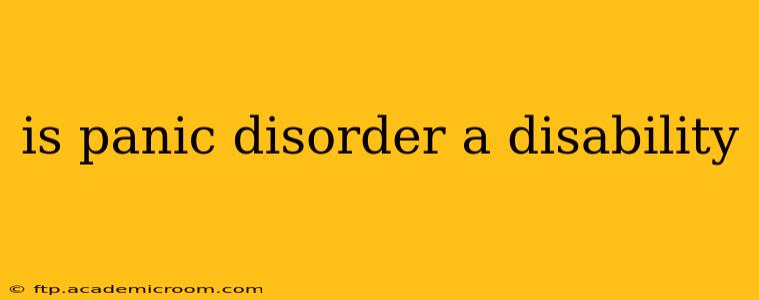Panic disorder, characterized by recurring, unexpected panic attacks, can significantly impact a person's life. The question of whether it constitutes a disability is complex and depends on several factors, including the severity of the condition and its impact on daily functioning. While panic disorder itself isn't automatically classified as a disability, its effects can certainly meet the criteria for disability under various legal frameworks. This article explores the nuances of this issue, answering frequently asked questions and providing valuable insights.
What is Panic Disorder?
Before diving into the disability aspect, it's crucial to understand panic disorder. It's an anxiety disorder marked by sudden episodes of intense fear or discomfort, accompanied by physical symptoms like rapid heartbeat, sweating, trembling, shortness of breath, and chest pain. These panic attacks can be unpredictable and debilitating, leading to significant distress and impairment in daily life.
Can Panic Disorder Qualify for Disability Benefits?
This is a key question, and the answer is: it depends. Many legal systems, such as the Social Security Administration (SSA) in the United States, define disability based on the individual's inability to perform substantial gainful activity (SGA) due to a medical condition. To qualify for disability benefits based on panic disorder, an individual must demonstrate that their symptoms are severe enough to prevent them from working or engaging in other essential life activities. This requires substantial documentation from medical professionals, detailing the frequency and intensity of panic attacks, the impact on daily functioning, and the attempts made to manage the condition.
What Documentation is Needed to Prove Panic Disorder as a Disability?
Extensive documentation is crucial. This typically includes:
- Diagnosis from a qualified mental health professional: A clear diagnosis of panic disorder is the first step.
- Treatment history: Records detailing the types of therapy (e.g., cognitive-behavioral therapy, CBT) and medications used, along with their effectiveness.
- Functional limitations: Detailed descriptions from the individual and their doctors outlining how panic disorder affects their daily activities, including work, social interactions, and self-care.
- Supporting evidence: Letters from employers, therapists, or other individuals who can attest to the limitations caused by the disorder.
How is Panic Disorder Diagnosed?
A thorough diagnosis involves a comprehensive evaluation by a mental health professional, typically a psychiatrist or psychologist. This assessment often includes:
- Clinical interview: A detailed discussion about symptoms, their frequency, intensity, and impact on daily life.
- Physical examination: To rule out other medical conditions that might be mimicking panic disorder symptoms.
- Psychological testing: May be used to further assess anxiety levels and rule out other mental health conditions.
What are the Treatment Options for Panic Disorder?
Several effective treatments are available for panic disorder, including:
- Cognitive-behavioral therapy (CBT): A type of psychotherapy that helps individuals identify and change negative thought patterns and behaviors contributing to their anxiety.
- Medication: Medications like selective serotonin reuptake inhibitors (SSRIs) and benzodiazepines can help manage symptoms, but they are often used in conjunction with therapy.
- Lifestyle changes: Stress management techniques, regular exercise, and a healthy diet can also play a significant role in managing panic disorder.
Is Panic Disorder Considered a Disability Under the Americans with Disabilities Act (ADA)?
Under the ADA, panic disorder can be considered a disability if it substantially limits one or more major life activities. This requires demonstrating that the condition significantly interferes with everyday tasks. For example, if panic attacks prevent an individual from working, attending social gatherings, or performing self-care, it may meet the ADA's definition of a disability. The ADA protects individuals with disabilities from discrimination in employment, public services, and other areas.
How Can I Get Accommodations for Panic Disorder at Work?
If your panic disorder affects your ability to perform your job, you might be eligible for reasonable accommodations under the ADA. These accommodations could include:
- Flexible work arrangements: Working from home or adjusting work hours.
- Modified work tasks: Adjusting job duties to minimize triggers or stressors.
- Mental health days: Time off to manage symptoms and seek treatment.
It is crucial to discuss your needs with your employer and HR department, providing documentation from your healthcare provider. The accommodations offered must be reasonable and not create an undue hardship for the employer.
Disclaimer: This information is intended for educational purposes only and should not be considered medical advice. It's essential to consult with qualified healthcare professionals for diagnosis, treatment, and guidance regarding disability benefits and accommodations. The specifics of disability classification and accommodations vary by location and legal system.
